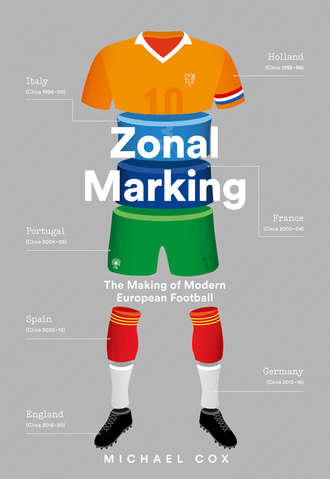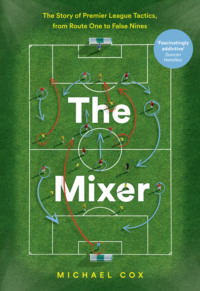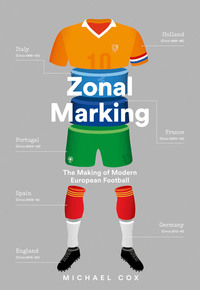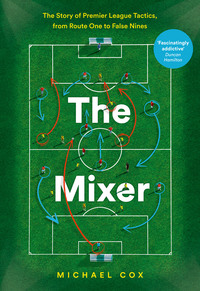
Полная версия
Zonal Marking
Whereas Van Gaal was a teacher, Cruyff wasn’t even a student. He’d been appointed Ajax manager in 1985 despite lacking the requisite coaching badges: Cruyff was Cruyff, and so, as always, an exception was made. And whereas Van Gaal was highly suspicious of individuals, Cruyff was delighted to indulge superstars, and his Barcelona side featured far more individual brilliance in the final third because he could, at various stages, count on four of the most revered superstars of this era: Michael Laudrup, Hristo Stoichkov, Romario and Gheorghe Hagi. The rise and fall of Cruyff’s Barcelona depended largely on his treatment of these players.
The most fascinating individual was Laudrup, effectively the Cruyff figure in Cruyff’s Dream Team. Cruyff had been his childhood hero, and at World Cup 1986, a tournament for which Holland failed to qualify, Laudrup was the outstanding player in the fabulous ‘Danish Dynamite’ side that drew comparisons to the Dutch Total Footballers of the 1970s. Laudrup signed for Barca in 1989 and immediately became the side’s technical leader, dropping deep from a centre-forward role to encourage midfield runners into attack. He could play killer through-balls with either foot, and possessed an uncanny ability to poke no-look passes with the outside of his right foot while moving to his left, leaving defenders bamboozled. He would finish his career, incidentally, with a one-year stint at Ajax in 1997/98.
On one hand, Cruyff adored Laudrup’s natural talent. When Laudrup scored a stupendous last-minute equaliser at Real Burgos in 1991/92, flicking the ball up with his left foot and smashing it into the top-right corner with his right, Laudrup rushed over to celebrate with a delighted Cruyff, among the warmest embraces between player and manager you’ll witness. But Cruyff also labelled him ‘one of the most difficult players I’ve worked with’, believing that Laudrup didn’t push his talents hard enough, and he constantly complained about his lack of leadership skills. Cruyff used Michels’s ‘conflict’ approach, but it only served to annoy the Dane, who was a nervous, reserved footballer requiring more delicate treatment.
The beneficiary of Laudrup’s measured through-balls was another supremely talented superstar, Bulgarian legend Stoichkov. ‘From more than 100 goals I scored, I’m sure that over 50 were assisted by Michael,’ Stoichkov said of his period at Barca. ‘To play with him was extremely easy – we found each other by intuition.’ That was a telling description; in a Van Gaal side attacking was about pre-determined moves, in a Cruyff side it was about organic relationships.
Like Laudrup, Stoichkov idolised Cruyff and still owned videos of the Dutchman when he agreed to join him at Barcelona, but he was completely different from Laudrup in terms of personality: aggressive, fiery and unpredictable. He’d been handed a lifelong ban from football in his homeland, later reduced to a year, for fighting at the 1985 Bulgarian Cup Final. After impressing Cruyff by scoring a wonderful chip over the head of Barcelona goalkeeper Andoni Zubizarreta for CSKA Sofia in the Cup Winners’ Cup, he arrived at the Camp Nou in 1989. ‘He had speed, finishing and character,’ Cruyff remembered. ‘We had too many nice guys, we needed someone like him.’ But in Stoichkov’s first Clásico he was shown a red card, stamped on the referee’s foot on his way off and was handed a ten-week ban. At another club Stoichkov might have been sacked, but Cruyff kept faith and he scored the winner on his return, then the following week scored four in a 6–0 victory at Athletic Bilbao. Stoichkov was worth indulging, even if he received ten red cards while at Barca, an incredible tally for a forward.
Unlike Laudrup, Stoichkov was well suited to Cruyff’s ‘conflict model’, perfectly understanding the purpose of his manager’s attacks. ‘In front of the group he told me that I was a disaster, that I wasn’t going to play the next game and that he was going to sell me,’ Stoichkov explained. ‘But at the end of training we would go and eat together.’ He repeatedly professed his hatred for Real Madrid, and supporters loved his attitude – Stoichkov would refuse to sign autographs, yet fans would just laugh at his anarchic nature. ‘He shook things up,’ said Zubizarreta. ‘Although he sometimes went too far, I am grateful for people like him who are capable of breaking the monotony of everyday life.’
Yet by 1993/94, when Cruyff won his final league title, Stoichkov wasn’t even the most arrogant forward at Barcelona, because Cruyff had raided Ajax’s rivals PSV to sign Brazilian striker Romario, an extraordinary talent who also had a reputation for skipping training sessions. ‘People say he’s a very difficult individual,’ suggested a journalist upon Romario’s arrival. ‘You could say the same thing about me,’ Cruyff fired back, delighted to sign a footballer who possessed his individualistic nature. Romario declared himself the world’s best-ever striker, announced he would score 30 league goals (he did, winning the Pichichi Trophy as La Liga’s top goalscorer), then spent the season promising that the 1994 World Cup would be ‘Romario’s tournament’ (it was, and he was then voted World Player of the Year). Whereas at PSV Romario was regularly involved in build-up play, at Barcelona he would vanish for long periods before providing a ruthless, decisive finish. His acceleration was incredible, he had a knack of surprising goalkeepers with toe-poked finishes and he unashamedly celebrated goals solo, even when he’d simply converted into a gaping net after a teammate had done the hard work.
Stoichkov and Romario had a love–hate relationship throughout their 18 months together. Cruyff said they had ‘the same problem’, thinking the side was built around them, and they sometimes appeared to be competing to score the most goals rather than combining as a traditional strike partnership. Yet it spurred both on to new heights, and they struck up a surprising friendship. ‘It seems bizarre and even now I ask myself how it was possible,’ Stoichkov said later. ‘But we became good friends right from the start; we were inseparable.’ Their wives became best friends, their children went to school together, Stoichkov became godfather to one of Romario’s sons and acted as a minder when Romario visited the hospital to visit his newborn, getting a photographer out of the way by punching him.
On the European stage their most memorable display was a 4–0 thrashing of Manchester United at Camp Nou in November 1994. Stoichkov scored the first, Romario grabbed the second, then Stoichkov dribbled forward, slipped in Romario, who backheeled a return pass for Stoichkov to smash in the third. Full-back Albert Ferrer rounded off the scoring. ‘We just couldn’t handle the speed of Stoichkov and Romario,’ admitted United manager Alex Ferguson. ‘The suddenness with which they attacked was a new experience.’ But for Barcelona fans the 5–0 thrashing of Real Madrid earlier that year meant more. Romario hit a hat-trick, including an opener featuring him outwitting Real centre-back Rafael Alkorta with an incredible move that became known as ‘the cow’s tail’: receiving the ball with his back to goal, then turning on the spot by touching the ball twice in one movement, dragging it around into his path and finishing. ‘It will go down in history,’ said Stoichkov, referring to Romario’s move when he could have been speaking about the scoreline. But Barca were hugely inconsistent at this point, and only an excellent late run meant they pinched the title from Deportivo on goal difference, the second straight season they’d triumphed courtesy of a rival slipping up on the final day. That wasn’t, in itself, disastrous – but a 4–0 loss to Milan in the 1994 European Cup Final was.
Things started to fall apart. Cruyff and Laudrup’s relationship had broken down, the Dane was omitted from the squad for that Milan final and his contract wasn’t renewed. He promptly imitated Cruyff’s controversial switch to Feyenoord in 1983, joining Real Madrid and inspiring them to the league title while Cruyff, intriguingly, claimed Laudrup had become too individualistic. ‘He lacked discipline,’ Cruyff protested. ‘If you have a lot of stars in a team, there has to be a limit as to what each does as an individual.’ This was something of a curious explanation, though, considering that Laudrup was evidently a selfless player who loved assisting others. The reality was that Barcelona simply now had brighter stars, and with the three-foreigner rule still in place, Laudrup had become fourth in the pecking order behind Romario, Stoichkov and centre-back Ronald Koeman.
Romario, meanwhile, was proving equally problematic, and his friendship with Stoichkov had broken down because of his complaints about the Brazilian’s increasingly hedonistic lifestyle. Other Barca players became equally exasperated. Having won the 1994 World Cup, Romario inevitably spent a month partying in Rio and returned to Barcelona late. Cruyff wasn’t too bothered by his tardiness, but Barcelona’s committee of senior players, including Koeman, Zubizarreta, José Bakero and Txiki Begiristain, demanded a meeting to address the situation. Cruyff reluctantly agreed, and sat down with the players, asking them to spell out their grievances. Romario listened attentively, before launching into an angry tirade. ‘You, you and you got knocked out early,’ he fired at the Spanish trio, before turning to Koeman and reminding him, ‘You got eliminated by me. You guys lost! I am the winner here! I thought this meeting would be to welcome me, to congratulate me, that you would give me a trophy. What am I doing answering to you guys? Go shove it up your arse!’ Cruyff’s response was typical: ‘Right, back to training.’
Meanwhile, in response to Laudrup’s departure, Cruyff recruited another absurdly talented attacker, Hagi, a magnificent player sometimes regarded almost interchangeably with Stoichkov, as two glorious number 10s who inspired their country to their peak in the mid-1990s. Only Cruyff would be crazy enough to pair them, and he welcomed the Romanian’s arrival by directly comparing him with Laudrup: ‘If you exchange Laudrup for Hagi, you have to assume you’re not trading down … I bet that Hagi scores at least double the number of goals Laudrup managed, and provides at least as many assists.’ Cruyff was wrong, and it was unusual to witness a manager so directly comparing the output of two footballers, especially considering he was denigrating a player so fundamental to his Dream Team.
Hagi was signed on the strength of his World Cup performances, which meant Cruyff had assembled three of that tournament’s All-Star Team XI: Romario, Stoichkov and Hagi. The Romanian was a tempestuous character: individualistic, aggressive, inconsistent, arrogant and lazy, but capable of producing genuine moments of magic. His injury-hit Barcelona spell was disappointing, but Hagi considered it successful because of the freedom he was granted. ‘There were several rumours and discussions about me, but Johan Cruyff had faith in me and gave me the opportunity to show what I could do. I repaid his confidence,’ he declared. Hagi produced a moment of genius in a 4–2 victory at Celta Vigo, taking the ball straight from kick-off in thick fog and shooting directly from the halfway line into the net, surely the ultimate example of individualism.
But Cruyff’s obsession with individualistic players was spiralling out of control. Romario’s attitude upon returning from the World Cup was a sign of things to come, and he spent most of his time in Barcelona partying, permanently renting two hotel suites to entertain guests. ‘Have sex every day, but three times at the most,’ was his self-declared motto. Throughout that second season, various Barcelona players suggested that Romario turned up for training barely able to move, having been up all night. Cruyff was forced to send him home, and Romario was frequently late for team meetings having overslept. ‘Romario never came back after the World Cup. His body was there but his mind was still in Rio’, sighed Stoichkov, while Cruyff simply complained that ‘he lacked discipline’, the exact words he’d used to describe Laudrup. The beginning of the end came exactly a year after Barcelona had defeated Real Madrid 5–0. Now, they lost to Real Madrid 5–0, with Laudrup sensational. Stoichkov was dismissed in the first half, while a desperately useless Romario was hauled off at the interval, never to play for Barca again. Cruyff had kept faith in the wrong individuals.
The following week Romario was voted World Player of the Year, while Stoichkov came second, the Bulgarian also winning the Ballon d’Or, which was then only open to Europeans. This was the starkest demonstration of Cruyff’s problem: Barcelona officially had the world’s two greatest players, but they were barely speaking to one another, or their manager, and their most recent performance saw neither making it into the second half of a 5–0 defeat. Cruyff was angry that Stoichkov even wanted to attend the presentation and made him train on the day of the ceremony, meaning he arrived late. ‘Something has gone wrong between me and the coach,’ bemoaned Stoichkov when he finally arrived, before referencing the individual versus collective dilemma again. ‘When we lose I am always the one singled out for blame. When we win, the whole team get the praise.’ Later he said something similar, but hardened his attack on his manager. ‘When we win it’s down to Cruyff, when we lose it’s the players’ fault.’ Cruyff’s conflict model had finally worn him down.
By the summer Stoichkov was gone, Romario had already returned to Brazil, Laudrup was celebrating a title victory in Madrid and only the underwhelming Hagi remained. Cruyff’s management had been undermined by his feuds with superstars and he responded, perhaps having enviously noted Van Gaal’s model at Ajax, by promoting from within, extending his trust to a host of youth products – Iván de la Peña, brothers Roger and Óscar García and his son Jordi – none of whom fulfilled their promise. New signing Luís Figo wasn’t yet ready to lead the side, while up front was the unspectacular and very un-Barca Bosnian Meho Kodro, who managed just nine goals. Cruyff was dismissed at the end of 1995/96 amidst a fall-out with club president José Luis Núñez, but arguments with star players had been equally decisive.
The Cruyff versus Van Gaal debate continued when Van Gaal took charge of Barcelona only a year after Cruyff’s departure. He proudly declared ‘Louis van Gaal is the star now’ at his presentation, and attempted to import his Ajax model, including several of his old players. This initially proved successful, as Van Gaal won the Double in his first season and retained the league title in his second. But, predictably, he couldn’t cope with Barcelona’s big names, and in particular Rivaldo, the bandy-legged Brazilian genius who was briefly the world’s greatest player. Compared with Stoichkov and Romario, Rivaldo was a true professional, and whereas Cruyff’s rows with star players were largely about off-field discipline, Van Gaal’s problems with Rivaldo were about tactical discipline.
In their third season together at Barca, Van Gaal became infuriated by Rivaldo’s determination to dribble past opponents, a quality that would have been worshipped in the Dream Team, not least by Cruyff. In an incident that recalled Stoichkov’s row with Cruyff, Rivaldo openly criticised his manager on the day he was confirmed as European Footballer of the Year, explaining he would no longer play wide-left. ‘It’s different in Brazil – there, people don’t talk about tactics, and that means freedom,’ he said. ‘Here’s it’s a bit complicated, it’s more tactical … for years I have been doing things for the team, and I’ve done nothing for myself. I want to enjoy it more. I have played on the wing for a while, and now I want to play in the centre, not just with the shirt number 10, but as a number 10.’
Van Gaal couldn’t tolerate this level of self-importance, and so for the trip to Rayo Vallecano two days later he omitted Europe’s best footballer from his 18-man squad. Barca could only draw. Rivaldo was also omitted for a 3–1 win over Real Sociedad, before Van Gaal relented, with the Brazilian coming off the bench to score the second in a 2–0 win over Celta Vigo. He didn’t miss a minute for the next seven games. Rivaldo had won the power struggle, which was the beginning of the end for Van Gaal. ‘I’ve given him too many chances,’ he later rued. ‘The equilibrium in the dressing room is gone – that was my biggest mistake this season. This culture needs stars. Now, I have two players who rank among the ten best in the world [Figo was the other]. At Ajax in 1995, when I did not lose a single game, I had nobody on that list.’ A dressing room lacking stars suited him much better. Van Gaal also rowed with Sonny Anderson and Geovanni, two of Rivaldo’s teammates and, significantly, compatriots. Brazilian footballing culture places emphasis on individual attacking inspiration, which simply didn’t register with Van Gaal, and he was dismissed at the end of the campaign.
For two legendary coaches both obsessed with promoting the classic Ajax style, Cruyff and Van Gaal were remarkably different in almost every respect. Consider, for example, their approach towards match preparation. Cruyff backed his players to outplay anyone, and didn’t even think about the tactical approach of the opposition. In stark contrast, Van Gaal would study videotapes of upcoming opponents and explain, in extensive detail, their build-up play and how to disrupt it, while his assistant Bruins Slot constantly surprised the players with his level of knowledge about specific opponents.
It was Cruyff’s art versus Van Gaal’s science. The latter sat in the dugout with a tactics notepad on his lap, depended on data to measure his players’ performance and employed a man named Max Reckers, who was generally described as a ‘computer boffin’ in an era before statistical analysts were common. When Van Gaal moved between clubs, his ‘archives’, including endless piles of dossiers and videotapes, needed to be physically moved across the continent at great expense. This was anathema to Cruyff, who once said that his great footballing qualities ‘were not detectable by a computer’, said his football understanding was a ‘sixth sense’, and repeatedly admitted he had a dreadful memory and wasn’t big on detail. He was all about instinct, and embodied a philosophy in the truest sense of the word. Van Gaal believed in a studious approach, and developed robotic footballers discouraged from demonstrating flair.
The Van Gaal versus Cruyff saga continued over the next 15 years. Van Gaal was appointed Holland coach in 2000 and immediately ripped up Cruyff’s plans for developing Dutch youth talent. The Netherlands’ failure to qualify for the 2002 World Cup, however, meant that his tenure proved disastrous and he returned to Ajax as technical director in 2004, where he infuriated a young striker who boasted the requisite arrogance for Amsterdam. ‘Van Gaal wanted to be a dictator,’ Zlatan Ibrahimović wrote in his autobiography. ‘He liked to talk about playing systems. He was one of those in the club who referred to the players as numbers. There was a lot of “5 goes here” and “6 goes there” … the same old stuff about how number 9 defends to the right, while number 10 goes to the left. We knew all that, and we knew he was the one who came up with it.’ By this point, Cruyff had been retired from coaching for eight years but continued to repeat a familiar message in interviews. ‘What I notice particularly is that policy-makers in football are never really concerned about individuals, all they’re concerned about is the team as a whole,’ he said. ‘Yet a team consists of 11 individuals, who each need attention.’
In 2009 Van Gaal took the Bayern Munich job, leading them to the Double and the Champions League Final. ‘My team has a bond and a trust in me that I have never experienced before,’ he raved, and he attracted rare praise from Cruyff. But his old rival pointedly suggested that ‘Bayern Munich and Van Gaal is a particularly good match – the management and players at the club were prepared to accept his way of thinking and operating.’ Which, coming from Cruyff, was barely disguised criticism, an accusation that Van Gaal was more Bayern than Ajax, more German than Dutch.
Van Gaal later even linked himself with the German national team job. ‘I dream of winning the World Cup with a team that can do it, and Germany is one of them,’ he admitted. This fitted with constant complaints in the Dutch media that Van Gaal was simply not very Dutch, and was more typical of the joylessly efficient Germans, traditionally Holland’s biggest rivals. Van Gaal was repeatedly considered ‘a dictator’, and in an intriguing biography of the coach, Dutch journalist Hugo Borst entitled one of the chapters ‘Hitler’ and examined the similarity between the two men. It’s a slightly unsettling part of the book, featuring Geovanni, the former Barcelona playmaker, referring to Van Gaal as ‘sick’, ‘crazy’ and ‘a Hitler’, and containing the story that a Romanian newspaper once ran a headline simply reading ‘Van Hitler’, stating that this was a common nickname for Van Gaal in the Netherlands. It was completely false, yet the fact it seemed plausible speaks volumes about his reputation.
The last squabbling between the two old foes came in 2011, after Van Gaal was announced as Ajax’s general director. Cruyff, by this stage, was on Ajax’s board of directors but Van Gaal’s appointment was made when he was on holiday in Barcelona. He objected so strongly that the issue ended up in court, which ruled against him. Yet in a sense Cruyff won, because Van Gaal never started his job, instead taking charge of the Dutch national side for a second time, an appointment that led to another round of mudslinging between the two old foes.
‘Van Gaal has a good vision on football,’ accepted Cruyff. ‘But it’s not mine. He wants to gel winning teams and has a militaristic way of working with his tactics. I don’t. I want individuals to think for themselves, and take the best decision on the pitch that is best for the situation. He wants to control all these situations as a coach. We need to make the club successful, including the youth academy, and that means individual coaching and not straitjacket tactics. If Louis comes to Ajax, I won’t be around for long. We think differently about everything in life.’
Van Gaal was more pragmatic, although he couldn’t resist one final wind-up. ‘There is no more a “Cruyff line” than there is a “Van Gaal line,”’ he insisted. ‘There is only an Ajax line, and it has been in place for at least 25 years. I have contributed to that, just as Cruyff has – with the difference that I was there longer.’
2
Space
The Netherlands, by its very nature, is based around the concept of space. A country whose name literally means ‘lower countries’ is a remarkable construct, gradually reclaimed from the sea through the revolutionary use of dikes. Seventeen per cent of the Netherlands’ landmass should be underwater, and only around 50 per cent of the country is more than one metre above sea level.
The Netherlands is also Europe’s most densely populated major country (excluding small countries such as Malta, San Marino and Monaco) and worldwide of countries with similar-sized or larger populations only South Korea, Bangladesh and Taiwan boast higher population densities. The history of the Netherlands has therefore been about increasing the perimeters of the nation, and then desperately trying to find space within those perimeters.
This is, of course, reflected in Dutch football. It’s through the prism of the country’s geography that David Winner explains Total Football in his seminal book Brilliant Orange. ‘Total Football was built on a new theory of flexible space,’ he begins. ‘Just as Cornelis Lely in the nineteenth century conceived and exercised the idea of creating new polders, so Rinus Michels and Johan Cruyff exploited the capacities of a new breed of players to change the dimensions of the football pitch.’
It was Michels who introduced the ideas, and Cruyff who both epitomised them and explained them most poetically. He outlined the importance of space in two separate situations: with possession and without possession. ‘Michels left an indelible mark on how I understood the game,’ Cruyff said. ‘When you’ve got possession of the ball, you have to ensure that you have as much space as possible, and when you lose the ball you must minimise the space your opponent has. In fact, everything in football is a function of distance.’ This became the default Dutch footballing mentality, ensuring everything was considered in terms of positioning and shape. Some nations considered the characteristics of footballers most important (‘strong and fast’), some focused on specific type of events (‘win fifty–fifty balls’), others only considered what to do with the ball (‘get it forward quickly’). But, from the Total Football era onwards, Dutch football was about space, and gradually other European nations copied the Dutch approach.






